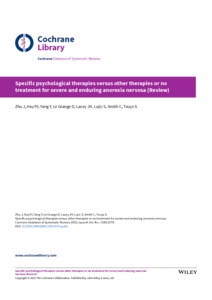Zhu, J; Hay, PJ; Yang, Y; Le Grange, D; Lacey, JH; Lujic, S; Smith, C; Touyz, S
(2023)
Specific psychological therapies versus other therapies or no treatment for severe and enduring anorexia nervosa.
Cochrane Database Syst Rev, 8 (8).
CD011570.
ISSN 1469-493X
https://doi.org/10.1002/14651858.CD011570.pub2
SGUL Authors: Lacey, John Hubert
![[img]](https://openaccess.sgul.ac.uk/116320/1.hassmallThumbnailVersion/Zhu_et_al-2023-Cochrane_Database_of_Systematic_Reviews.pdf)  Preview |
|
PDF
Published Version
Available under License ["licenses_description_publisher" not defined].
Download (624kB)
| Preview
|
Abstract
BACKGROUND: Anorexia nervosa is a psychological condition characterised by self-starvation and fear or wait gain or other body image disturbance. The first line of treatment is specific psychological therapy; however, there is no consensus on best practice for treating people who develop severe and enduring anorexia nervosa (SEAN). Notably, there is no universal definition of SEAN. OBJECTIVES: To evaluate the benefits and harms of specific psychological therapies for severe and enduring anorexia nervosa compared with other specific therapies, non-specific therapies, no treatment/waiting list, antidepressant medication, dietary counselling alone, or treatment as usual. SEARCH METHODS: We used standard, extensive Cochrane search methods. The last search date was 22 July 2022. SELECTION CRITERIA: We included parallel randomised controlled trials (RCTs) of people (any age) with anorexia nervosa of at least three years' duration. Eligible experimental interventions were any specific psychological therapy for improved physical and psychological health in anorexia nervosa, conducted in any treatment setting with no restrictions in terms of number of sessions, modality, or duration of therapy. Eligible comparator interventions included any other specific psychological therapy for anorexia nervosa, non-specific psychological therapy for mental health disorders, no treatment or waiting list, antipsychotic treatment (with or without psychological therapy), antidepressant treatment (with or without psychological therapy), dietary counselling, and treatment as usual as defined by the individual trials. DATA COLLECTION AND ANALYSIS: We used standard methodological procedures expected by Cochrane. Our primary outcomes were clinical improvement (weight restoration to within the normal weight range for participant sample) and treatment non-completion. Results were presented using the GRADE appraisal tool. MAIN RESULTS: We found two eligible studies, but only one study provided usable data. This was a parallel-group RCT of 63 adults with SEAN who had an illness duration of at least seven years. The trial compared outpatient cognitive behaviour therapy for SEAN (CBT-SEAN) with specialist supportive clinical management for SEAN (SSCM-SE) over eight months. It is unclear if there is any difference between the effect of CBT-SEAN versus SSCM-SE on clinical improvement at 12 months (risk ratio (RR) 1.42, 95% confidence interval (CI) 0.66 to 3.05) or treatment non-completion (RR 1.72, 95% CI 0.45 to 6.59). There were no reported data on adverse effects. The trial was at high risk of performance and detection bias. We rated the GRADE level of evidence as very low-certainty for both primary outcomes, downgrading for imprecision and risk of bias concerns. AUTHORS' CONCLUSIONS: This review reports evidence from one trial that evaluated CBT-SEAN versus SSCM-SE. There was very low-certainty evidence of little or no difference in clinical improvement and treatment non-completion between the two therapies. There is a need for larger high-quality trials to determine the benefits of specific psychological therapies for people with SEAN. These should take into account the duration of illness as well as participants' previous experience with evidence-based psychological therapy for anorexia nervosa.
| Item Type: |
Article
|
| Additional Information: |
This Cochrane Review was published in the Cochrane Database of Systematic Reviews 2023, Issue 8. Cochrane Reviews are regularly updated as new evidence emerges and in response to feedback, and the Cochrane Database of Systematic Reviews should be consulted for the most recent version of the Cochrane Review.
Citation: Zhu J, Hay PJ, Yang Y, Le Grange D, Lacey JH, Lujic S, Smith C, Touyz S. Specific psychological therapies versus other therapies or no treatment for severe and enduring anorexia nervosa. Cochrane Database of Systematic Reviews 2023, Issue 8. Art. No.: CD011570. DOI: 10.1002/14651858.CD011570.pub2. http://dx.doi.org/10.1002/14651858.CD011570.pub2 |
| Keywords: |
Adult, Humans, Child, Preschool, Anorexia Nervosa, Antipsychotic Agents, Cognitive Behavioral Therapy, Drug-Related Side Effects and Adverse Reactions, Fear, Humans, Antipsychotic Agents, Fear, Anorexia Nervosa, Adult, Child, Preschool, Drug-Related Side Effects and Adverse Reactions, Cognitive Behavioral Therapy, 11 Medical and Health Sciences, 17 Psychology and Cognitive Sciences, General & Internal Medicine |
| SGUL Research Institute / Research Centre: |
Academic Structure > Population Health Research Institute (INPH) |
| Journal or Publication Title: |
Cochrane Database Syst Rev |
| ISSN: |
1469-493X |
| Language: |
eng |
| Publisher License: |
Publisher's own licence |
| PubMed ID: |
37610143 |
| Web of Science ID: |
WOS:001121805000022 |
| Dates: |
| Date |
Event |
| 2023-08-23 |
Published |
| 2023-06-08 |
Accepted |
|
 |
Go to PubMed abstract |
| URI: |
https://openaccess.sgul.ac.uk/id/eprint/116320 |
| Publisher's version: |
https://doi.org/10.1002/14651858.CD011570.pub2 |
Statistics
Item downloaded times since 12 Apr 2024.
Actions (login required)
 |
Edit Item |



